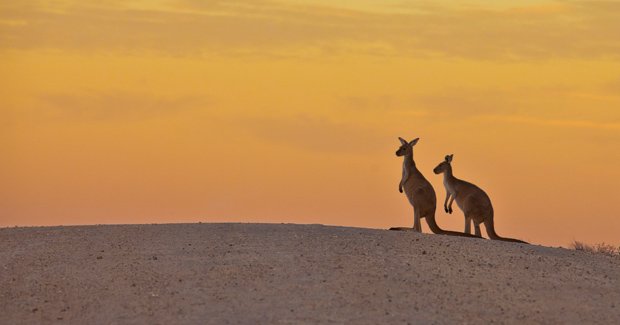Kangaroo still a good option for Christmas

IF YOU’RE EATING KANGAROO for sustainability reasons, you have nothing to fear from recent reports suggesting you should stop eating kangaroo meat, according to leading scientists and meat industry analysts, who have slammed a recent report.
In late November, the Think Tank for Kangaroos (THINKK), based at the University of Technology, Sydney, released two controversial papers, in a forum provocatively titled Killing Skippy.
One documents the law and policy about the killing of kangaroos; the other questions the sustainability of the kangaroo industry. In particular, it questions the assumption that kangaroo meat is a good ecological substitute for sheep – the argument being that sheep are an introduced species and their hoofs and grazing habits lead to much greater erosion and damage to the landscape.
“The number of kangaroos necessary to supplant meat production from sheep…for an environmentally meaningful benefit is ecologically unfeasible,” the report says.
Slammed the science
It claims that for all Australians to get one serve of kangaroo a week,
we would need to slaughter 22 million kangaroos a year, which only
number around 30 million in the wild anyway. In comparison, we’d only need to slaughter eight million sheep for the same amount of meat. Currently about three million kangaroos are killed each year.
But critics have slammed the science and the figures in the report. “It’s based on insane, nonsensical information,” says Professor Mike Archer at the University of New South Wales. “Everyone is entitled to their own opinion, but not to their own facts.”
Mike says that we wouldn’t need nearly as many as 22 million kangaroos for food; he believes the “crazy” THINKK figures overestimate the amount of meat that Australians require.
The figure provided by the report to estimate the number of kangaroos available for harvest is wrong too, he says. “It’s only from the areas where there is harvesting. It ignores areas of Australia where there is no harvesting, which is about half of the continent…What’s more, we could have three times the number of roos if we stopped farming sheep.”
Harvesting is necessary
John Kelly, executive officer of the Kangaroo Industry Association of Australia in Canberra, says some kangaroo harvesting is necessary in any case. There are no longer the levels of dingo and Aboriginal predation on roos that there were prior to European settlement, and dams on properties have increased the number of watering points for kangaroos to survive.
Harvesting is sustainable, says John, as evidenced by the continuing large populations of kangaroos. “During the period 1999-2003, kangaroo numbers reached record levels. That was the period that the kangaroo population got up to 57 million.”
He says that in the rangelands, kangaroos have been shown to represent about 30 per cent of grazing pressure, so are considered an agricultural pest by farmers. “The kangaroo harvest is the only tool we have to control total grazing pressure.”
Dror Ben-Ami, a research fellow with THINKK who co-wrote the report, admits that at the local level, some graziers need to remove kangaroos from their property, but believes this can be done with non-lethal means, such as translocation or contraceptive control. “We don’t need a landscape [or] state-wide cull,” Dror says. “Kangaroos are really not pests.”
Biased research?
Critics of THINKK point out that it is funded by Voiceless, an animal-rights group that campaigns for an end to all farmed meat. “Certainly, our key message is to eat less meat,” Dror says. “Voiceless are key sponsors of ours, but we let the science guide us.”
Peter Ampt, a lecturer in national resource management at University of Sydney, says THINKK’s research is badly biased and the reports haven’t been published in a peer-reviewed journal. “The THINKK group is starting from a point of view that the culling of kangaroos should be stopped,” he says.
Peter says that many studies – the most recent of which is being completed by Brett Howlett from Australian National University in Canberra – have shown that without population management, kangaroos have a detrimental effect on biodiversity.
“In the past the impact of kangaroos may have been overstated, but THINKK is trying to understate it,” he says. “The reality is probably somewhere in the middle.”

